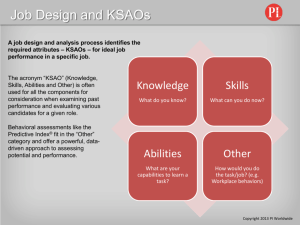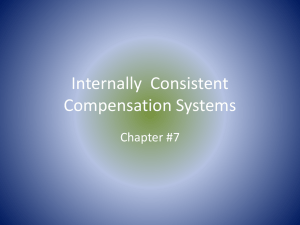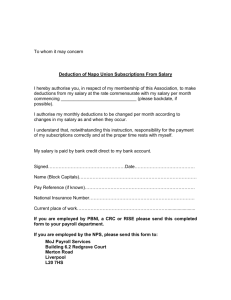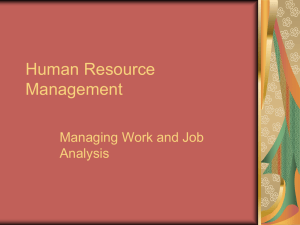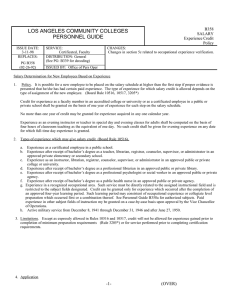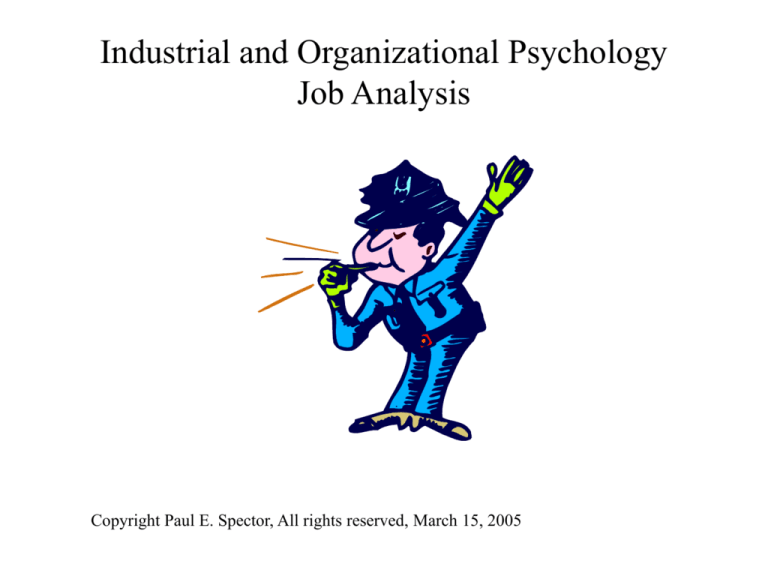
Industrial and Organizational Psychology
Job Analysis
Copyright Paul E. Spector, All rights reserved, March 15, 2005
What is Job Analysis
• JOB ANALYSIS: Family of formal methods for
describing jobs and human attributes necessary for jobs.
• Answers Two Major Questions
– 1. What do people in a particular job do? (Task oriented)
– 2. What human characteristics are necessary for a job? (Person
oriented)
•
•
Unit of analysis is the job not the individual.
Deals with tasks/requirements for all positions within a
job classification or title rather than individual people's
jobs
Major Job Analysis Concepts
• KSAO
•
Knowledge: Know to do a task
•
Skill: Can do a task
•
Ability: Capability to learn to do a task
•
Other personal characteristics: Other attributes needed
• Subject Matter Expert (SME)
•
Job incumbents
•
Supervisors
Examples Of KSAOs For Different
Occupations
Job
Knowledge
Lawyer
Constitutional
rights
Nurse
Skill
Ability
Other Personal
Characteristics
Writing
clearly
Communication
Willingness to
work long
hours
Surgical
procedures
Drawing
blood
Remain calm
in a crisis
Plumber
Pipe design
Soldering
joints
Hand-eye
coordination
Lack of
squeamishness
in the sight of
blood
Willingness to
get dirty
Teacher
Learning
principles
Writing
clearly
Relate to
children
Commitment
to learning
Purposes of Job Analysis
•
•
•
•
•
•
•
•
•
•
•
Career development
Career ladder: What does it take to move up?
Human resource planning
Project future needs: What kinds of people will we need?
Legal defense
Essential functions: What tasks must be done?
Job relevance: Is KSAO necessary to do the job?
Performance appraisal
Selection: What sorts of people should we hire?
Training: What knowledge and skills are needed?
Research
Sources of Job Analysis Information
•
•
•
•
•
•
•
•
•
Sources Of Job Analysis Data
Analyst
Subject Matter Expert: SME
Incumbent
Supervisor
Records
Data base
Dictionary of Occupational Titles: DOT
Occupational Information Network: O*NET
Data Collection Approaches
•
•
•
•
•
•
•
•
•
Questionnaire
Interview
Diary
Observation
Doing work
Specific Methods of Job Analysis
• Critical incidents
• Functional job analysis: O*NET & its predecessor DOT
• Positional Analysis Questionnaire, PAQ
• Task inventory
• Choosing a method: Depends on purpose
• Job analysis for teams
Job Evaluation
• Formal, typically mathematical, means of calculating value of job (not
individual) to an organization.
• Steps:
•
1. Job analysis to Identify important compensable factors
•
2. Rate factors on importance (quantitative weights)
•
3. Rate each job on factors
•
4. Combine ratings for job
• Uses:
•
Evaluate salary levels to determine equity
•
Set salary levels for existing jobs
•
Determine salary levels for new jobs
•
Comparable worth

